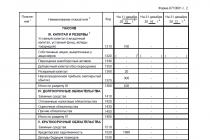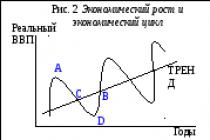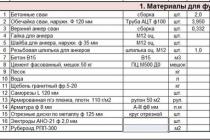16.05.2016
Application of agreements on avoidance of double taxation concluded by the Russian Federation.
Currently avoidance agreements double taxation signed by Russia with more than 80 states. Among them are many EU countries, including Cyprus, Great Britain, Denmark, the Netherlands; Switzerland; USA; China; CIS countries, incl. Ukraine, Belarus, Kazakhstan; the Baltic countries - Latvia, Lithuania and a number of others (see the List of valid double taxation agreements).
IMPORTANT: If an international tax agreement provides for a different tax rate than that provided for by the Tax Code of the Russian Federation, then the rate specified in the double taxation agreement is applied!
Let us dwell on some of the most significant aspects of the application of international tax treaties in Russia.
Duties of a tax agent
Responsibility for the correct calculation and withholding of tax at source (including the correct application of benefits (reduced rates and exemptions) provided for by international international tax agreements lies with the tax agent.
According to the Tax Code of the Russian Federation, tax on income received by a foreign organization from sources in the Russian Federation, calculated and retained by a Russian organization ( tax agent), paying income foreign organization, at each income payment, in the income payment currency. The exception is when:
- the income paid relates to the permanent establishment of the foreign organization receiving the income in the Russian Federation;
- in relation to income paid to a foreign organization, Article 284 of the Tax Code of the Russian Federation provides tax rate 0%;
- income, in accordance with international treaties of the Russian Federation, is not taxed in the Russian Federation (subject to the presentation by a foreign organization to the tax agent of the confirmation provided for in paragraph 1 of article 312 of the Tax Code of the Russian Federation);
- in some other cases, provided for in paragraph 2 of Art. 310 of the Tax Code of the Russian Federation.
It should be remembered that the unlawful non-withholding and (or) non-transfer (incomplete withholding and (or) transfer) within the period established by the Tax Code of the Russian Federation of tax amounts subject to withholding and transfer by a tax agent forms part of tax offense and entails the collection of a fine in the amount of 20 percent of the amount to be withheld and (or) transferred (Article 123 of the Tax Code of the Russian Federation), as well as penalties (on the issue of collecting penalties from a tax agent, see Resolution of the Presidium of the Supreme Arbitration Court of the Russian Federation No. 4047/06 dated September 26 2006).
Confirmation of the permanent location of a foreign organization
Subparagraph 4 of paragraph 2 of Article 310 of the Tax Code of the Russian Federation provides that in the event that a Russian organization pays income to a foreign organization for which, in accordance with international treaties (agreements), a preferential taxation regime is provided in the Russian Federation, such income is exempted from withholding tax at the source of payment or tax withholding at the source of payment at reduced rates, subject to presentation by a foreign organization to a tax agent confirmation, provided for in paragraph 1 of Article 312 of the Tax Code of the Russian Federation.
In accordance with paragraph 1 of Art. 312 of the Tax Code of the Russian Federation, the specified confirmation must meet the following requirements:
- must be certified by the competent authority of the relevant foreign state,
- if this confirmation is drawn up in a foreign language, the tax agent is also provided with a translation into Russian language,
- confirmation must be provided by the foreign entity prior to the income payment date.
Thus, if at the time of payment of income to a foreign organization Russian organization- the source of payment of income does not have the specified confirmation, then it is obliged to withhold tax at the source of payment according to statutory rate.
At the same time, if the specified confirmation appears at the disposal of the tax agent later, it is possible to refund the previously withheld tax on income paid to foreign organizations in accordance with paragraph 2 of Art. 312 of the Tax Code of the Russian Federation. For this in tax authority the following documents must be submitted:
Application for refund of withheld tax in the prescribed form;
Confirmation that this foreign organization at the time of payment of income had a permanent location in the state with which the Russian Federation has an international treaty (agreement) regulating taxation issues;
Copies of the agreement (or other document) in accordance with which the income was paid to the foreign legal entity, and copies of payment documents confirming the transfer of the amount of tax to be refunded to the budget;
An application for the refund of taxes previously withheld in the Russian Federation, as well as other documents listed above, shall be submitted by the foreign recipient of income to the tax authority at the place of registration of the tax agent within three years from the end date in which the income was paid.
The status of “beneficial recipient of income” as a condition for the application of benefits under double taxation agreements
When applying agreements for the avoidance of double taxation in terms of granting the right to use benefits (reduced rates and exemptions) in taxation certain types income from sources in the Russian Federation, it is necessary to assess whether the person claiming the benefits (reduced rates and exemptions) is “the actual recipient (beneficial owner)” of the relevant income.
International tax treaties are based on the Model Convention on Taxes on Income and Capital) and on the official commentaries to it, containing the interpretation of its provisions.
When applying the provisions of tax treaties, it must be assumed that the term "beneficial recipient (beneficial owner) of income" is not used in a narrow technical sense, but should be understood based on the goals and objectives of international tax treaties, such as the avoidance of double taxation and evasion from the payment of taxes, and taking into account such basic principles of contracts as the prevention of abuse of the provisions of the contract and the predominance of essence over form. At the same time, the direct recipient of income, although it can qualify as a resident, cannot, for this reason alone, by default be considered as the beneficial owner of the income received in the state of residence.
Provision in the source state of income paid to a foreign person tax breaks(reduced rates and exemptions) is also contrary to the goals and objectives of international agreements, if the recipient of such income, without formally using such tools as agency or nominal holding, acts as an intermediate link in the interests of another person who actually benefits from the relevant income. Such an intermediate, for example, a conduit company, cannot be considered as a beneficial owner of the income received, if, despite its formal status as the owner of income in a transaction with a person who is a tax resident of the state - the source of income, such a company has very narrow powers in relation to this income, which allows it to be considered as confidant or a manager acting on behalf of the interested parties.
To recognize a person as the actual recipient of income (beneficial owner), it is necessary not only to have legal grounds for direct income, but that person must also be immediate that is, the person who actually benefits from the income received and determines its further economic fate. When determining the actual recipient (beneficial owner) of income, one should also take into account the functions performed and the risks assumed by a foreign organization claiming benefits in accordance with international tax treaties.
Provided by agreements on avoidance of double taxation privileges ( reduced rates and release) in relation to paid income from a source in the Russian Federation do not apply if they are paid as part of a transaction or a series of transactions carried out in such a way that foreign person applying for benefits in the form of a reduced rate of interest and royalties, pays directly or indirectly all or almost all income (at any time and in any form) to another person who would not have the benefits (reduced rates and exemptions) under the relevant tax treaty, if such income was paid directly to such person.
Thus, the position of the Ministry of Finance of Russia is that the benefits (reduced rates and exemptions) provided for by agreements on the avoidance of double taxation, when paying income in the form of dividends, interest and income from the use of copyright from sources in the Russian Federation, are applied only if a resident of a foreign state with which Russia has concluded a relevant agreement is the actual recipient of income.
Application of double tax treaties in other states
"Classic" offshore zones rarely have double taxation agreements concluded, which can be used to optimize income payments to non-resident structures. Therefore, low-tax and onshore jurisdictions, such as Cyprus, Great Britain, Denmark, the Netherlands, other European states, etc., are suitable for the application of tax treaties.
For example, Great Britain has the world's largest network of tax treaties (more than 100). However, the application of tax treaties is possible only if the company is not nominal, that is, it is not an agent of an offshore principal company, which owns the majority of the profit (income). Only if the income is recognized as the income of an English company can it claim to use the agreement. Of course, it is not possible for a tax treaty to be applied by a company filing "dormant reports" - dormant accounts. It is possible to use agreements in holding schemes.
One of the countries most suitable for the application of international tax treaties, as before, remains Republic of Cyprus(has more than 40 active agreements). Tax residence certificate, issued by the Ministry of Finance at any time after the registration of the company. An important condition for obtaining a certificate is the presence of local directors - residents of Cyprus.
Tax residency certificates are also issued in other jurisdictions. significant for tax planning (Denmark, the Netherlands, Luxembourg, Latvia, Malta and other countries). However, an important factor, affecting the possibility of obtaining a tax certificate, is the presence of the company's "real content" (substance) in the country of registration.
Criteria for such presence. which a company must meet in order to be considered a tax resident of its country, may be the following:
- the presence of a real office at a real address in the country of registration of the company;
- the presence of local directors (residents of the country of registration of the company) who manage the company in the territory of this country;
- Availability bank account(main) at a local bank;
- storage of financial documentation and reporting in an office in the country of registration of the company;
- availability of staff;
- implementation of real activities, etc.
The extent of such presence may vary depending on the objectives of the company (eg trading or holding activities).
Most countries enter into double tax treaties with other countries to facilitate the exchange of information and prevent double taxation of the income of their residents, who may either receive income from another country or be de facto residents of both countries. Most of the agreements are based on the conventions of the Organization economic cooperation and Development (OECD)
UK and Russia
The UK and Russia are no exception, and such an agreement was signed by Douglas Hurd and Andrey Kozyrev in 1994. The agreement is quite complex and consultation should be sought to determine exactly where each source of income will be taxed. Some types of income, such as dividends or interest, may be taxed in both countries. In this case, the tax fully paid in one country is granted tax relief from taxable amounts in another country. The agreement between the UK and Russia is generally in line with the OECD convention, as are most such agreements. However, some items have their own characteristics.
This agreement covers the taxation of income received in the UK, capital gains taxes for individuals and corporation tax for companies. At the same time, like many other agreements, it does not deal with inheritance tax at all. The agreement is legal document, and is difficult to summarize, but it covers most of the taxation matters of a resident of any country who derives income or capital gains in another country.
Examples of income covered by the agreement
Income from employment (wage) is taxed in only one country in which the employee is resident. An exception is the case when an employee, being a resident of one country, performs most of his work duties in another country.
Business profit taxable only in the country in which the business has a permanent establishment. However, if the company is located in the UK and has a permanent establishment in Russia, then Russia may also tax the company's profits, but only in the amount that is received from the activities of the permanent establishment in Russia. The definition of a permanent establishment is given in the agreement.
Dividends paid by a company located in one country to a resident of another country are taxed in both countries. The company or institution paying the dividend withholds tax on the full amount of the payment. In accordance with the OECD convention, these deductions cannot exceed 15%. The recipient of the dividends is then taxed in his country of residence, and the tax already paid in another country is credited to him in the total amount of tax that should be taxed on the full amount of dividends.
Interest is taxed in the same way as dividends, but maximum amount The tax here is limited to 10%.
capital gain is also a complex topic, and depends on the types of assets to be disposed of, which are listed in the agreement. In general, capital gains in respect of real estate received by a resident of one of the countries will be taxed in the country where the property is located. On the other hand, capital gains movable property will be taxed in the country of residence individual(for example, an increase in the value of shares).
In the table below you will find a list of countries with which Russia has a double tax treaty. Let's say your organization pays income to a company whose permanent location is located in another state. If Russia has a double tax treaty with this country, your company as a tax agent will be able to either not withhold tax on the income paid, or withhold it at a reduced rate (depending on the terms of the agreement between the countries).
List of valid bilateral international treaties for the avoidance of double taxation
| State | international treaty |
| Australia | Agreement between the Government of the Russian Federation and the Government of Australia dated September 7, 2000 "On the avoidance of double taxation and the prevention of tax evasion with respect to taxes on income" |
| Austria | Convention between the Government of the Russian Federation and the Government of the Republic of Austria of April 13, 2000 "For the Avoidance of Double Taxation with Respect to Taxes on Income and Capital" |
| Azerbaijan | Agreement between the Government of the Russian Federation and the Government Republic of Azerbaijan dated July 3, 1997 "On the avoidance of double taxation with respect to taxes on income and property" |
| Albania | Convention between the Government of the Russian Federation and the Government of the Republic of Albania of April 11, 1995 "On the Avoidance of Double Taxation with Respect to Taxes on Income and Property" |
| Algeria | Convention between the Government of the Russian Federation and the Government of the Algerian People's Democratic Republic of March 10, 2006 "On the avoidance of double taxation with respect to taxes on income and property" |
| Argentina | Convention between the Government of the Russian Federation and the Government of the Argentine Republic of October 10, 2001 "For the Avoidance of Double Taxation with Respect to Taxes on Income and Capital" |
| Armenia | Agreement between the Government of the Russian Federation and the Government of the Republic of Armenia dated December 28, 1996 "On the Elimination of Double Taxation on Income and Property" |
| Belarus | Agreement between the Government of the Russian Federation and the Government of the Republic of Belarus dated April 21, 1995 "On the avoidance of double taxation and the prevention of tax evasion in relation to taxes on income and property." An integral part Agreement is the Protocol of January 24, 2006. |
| Belgium | Convention between the Government of the Russian Federation and the Government of the Kingdom of Belgium of June 16, 1995 "On the avoidance of double taxation and the prevention of tax evasion with respect to taxes on income and property" |
| Bulgaria | Agreement between the Government of the Russian Federation and the Government of the Republic of Bulgaria dated June 8, 1993 "On the avoidance of double taxation with respect to taxes on income and property" |
| Botswana | Convention between the Government of the Russian Federation and the Government of the Republic of Botswana of April 8, 2003 "On the avoidance of double taxation and the prevention of tax evasion with respect to taxes on income" |
| Brazil | Convention between the Government of the Russian Federation and the Government of the Federative Republic of Brazil of November 22, 2004 "For the avoidance of double taxation and the prevention of tax evasion with respect to taxes on income" |
| Great Britain | Convention between the Government of the Russian Federation and the Government of the United Kingdom of Great Britain and Northern Ireland of February 15, 1994 "For the Avoidance of Double Taxation and the Prevention of Tax Evasion with Respect to Taxes on Income and Capital Gains" |
| Hungary | Convention between the Government of the Russian Federation and the Government of the Republic of Hungary of April 1, 1994 "For the Avoidance of Double Taxation with Respect to Taxes on Income and Property" |
| Venezuela | Convention between the Government of the Russian Federation and the Government of the Bolivarian Republic of Venezuela of December 22, 2003 "On the avoidance of double taxation and the prevention of tax evasion with respect to taxes on income and capital" |
| Vietnam | Agreement between the Government of the Russian Federation and the Government of the Socialist Republic of Vietnam dated May 27, 1993 "On the avoidance of double taxation and the prevention of tax evasion with respect to taxes on income" |
| Germany | Agreement between the Russian Federation and the Federal Republic of Germany dated May 29, 1996 "On the avoidance of double taxation with respect to taxes on income and property" |
| Greece | Convention between the Government of the Russian Federation and the Government of the Hellenic Republic of June 26, 2000 "For the avoidance of double taxation and the prevention of tax evasion with respect to taxes on income and capital" |
| Denmark | Convention between the Government of the Russian Federation and the Government of the Kingdom of Denmark of February 8, 1996 "On the avoidance of double taxation and the prevention of tax evasion with respect to taxes on income and property" |
| Egypt | Agreement between the Government of the Russian Federation and the Government of the Arab Republic of Egypt of September 23, 1997 "On the avoidance of double taxation and the prevention of tax evasion with respect to taxes on income and capital" |
| Israel | Convention between the Government of the Russian Federation and the Government of the State of Israel of April 25, 1994 "On the avoidance of double taxation and the prevention of tax evasion with respect to taxes on income" |
| India | Agreement between the Government of the Russian Federation and the Government of the Republic of India dated March 25, 1997 "On the Avoidance of Double Taxation with Respect to Income Taxes" |
| Indonesia | Agreement between the Government of the Russian Federation and the Government of the Republic of Indonesia dated March 12, 1999 "On the avoidance of double taxation and the prevention of tax evasion on income" |
| Iran | Agreement between the Government of the Russian Federation and the Government of the Islamic Republic of Iran dated March 6, 1998 "On the avoidance of double taxation and the prevention of tax evasion with respect to taxes on income and capital" |
| Ireland | Agreement between the Government of the Russian Federation and the Government of Ireland dated April 29, 1994 "On the avoidance of double taxation with respect to taxes on income" |
| Iceland | Convention between the Government of the Russian Federation and the Government of the Republic of Iceland of November 26, 1999 "On the avoidance of double taxation and the prevention of tax evasion on income" |
| Spain | Convention between the Government of the Russian Federation and the Government of the Kingdom of Spain of December 16, 1998 "For the avoidance of double taxation and the prevention of tax evasion with respect to taxes on income and capital" |
| Italy | Convention between the Government of the Russian Federation and the Government of the Italian Republic of April 9, 1996 "For the avoidance of double taxation with respect to taxes on income and capital and the prevention of tax evasion" |
| Kazakhstan | Convention between the Government of the Russian Federation and the Government of the Republic of Kazakhstan dated October 18, 1996 "On the elimination of double taxation and the prevention of tax evasion on income and capital" |
| Canada | Agreement between the Government of the Russian Federation and the Government of Canada dated October 5, 1995 "On the avoidance of double taxation and the prevention of tax evasion with respect to taxes on income and property" |
| Qatar | Agreement between the Government of the Russian Federation and the Government of the State of Qatar dated April 20, 1998 "On the avoidance of double taxation with respect to taxes on income" |
| Cyprus | Agreement between the Government of the Russian Federation and the Government of the Republic of Cyprus dated December 5, 1998 "On the avoidance of double taxation with respect to taxes on income and capital" |
| Kyrgyzstan | Agreement between the Government of the Russian Federation and the Government of the Kyrgyz Republic of January 13, 1999 "On the avoidance of double taxation and the prevention of income tax evasion" |
| China | Agreement between the Government of the Russian Federation and the Government of the People's Republic of China dated May 27, 1994 "On the avoidance of double taxation and the prevention of tax evasion with respect to taxes on income" |
| North Korea | Agreement between the Government of the Russian Federation and the Government of the Democratic People's Republic of Korea dated September 26, 1997 "On the avoidance of double taxation with respect to taxes on income and capital" |
| Korea | Convention between the Government of the Russian Federation and the Government of the Republic of Korea dated November 19, 1992 "On the avoidance of double taxation with respect to taxes on income" |
| Cuba | Agreement between the Government of the Russian Federation and the Government of the Republic of Cuba of December 14, 2000 "On the avoidance of double taxation and the prevention of tax evasion on income and capital" |
| Kuwait | Agreement between the Russian Federation and the State of Kuwait dated February 9, 1999 "On the avoidance of double taxation and the prevention of tax evasion with respect to taxes on income and capital" |
| Latvia | Agreement between the Government of the Russian Federation and the Government of the Republic of Latvia dated December 20, 2010 "On the Avoidance of Double Taxation and the Prevention of Tax Evasion in Respect of Taxes on Income and Capital" |
| Lebanon | Convention between the Government of the Russian Federation and the Government of the Lebanese Republic of April 8, 1997 "On the avoidance of double taxation and the prevention of tax evasion with respect to taxes on income" |
| Lithuania | Agreement between the Government of the Russian Federation and the Government of the Republic of Lithuania dated June 29, 1999 "On the avoidance of double taxation and the prevention of tax evasion with respect to taxes on income and capital" |
| Luxembourg | Agreement between the Russian Federation and the Grand Duchy of Luxembourg dated June 28, 1993 "On the avoidance of double taxation and the prevention of tax evasion with respect to taxes on income and property" |
| Macedonia | Agreement between the Government of the Russian Federation and the Government of the Republic of Macedonia dated October 21, 1997 "On the avoidance of double taxation with respect to taxes on income and property" |
| Malaysia | Agreement between the Government of the USSR and the Government of Malaysia dated July 31, 1987 "On the avoidance of double taxation with respect to taxes on income" |
| Mali | Convention between the Government of the Russian Federation and the Government of the Republic of Mali of June 25, 1996 "On the Avoidance of Double Taxation and the Establishment of Rules for the Provision of Mutual Assistance in Respect of Taxes on Income and Property" |
| Morocco | Agreement between the Government of the Russian Federation and the Government of the Kingdom of Morocco dated September 4, 1997 "On the avoidance of double taxation with respect to taxes on income and property" |
| Mexico | Agreement between the Government of the Russian Federation and the Government of the United Mexican States dated June 7, 2004 "On the Avoidance of Double Taxation with Respect to Income Taxes" |
| Moldova | Agreement between the Government of the Russian Federation and the Government of the Republic of Moldova dated April 12, 1996 "On the avoidance of double taxation of income and property and the prevention of tax evasion" |
| Mongolia | Agreement between the Government of the Russian Federation and the Government of Mongolia dated April 5, 1995 "On the avoidance of double taxation with respect to taxes on income and property" |
| Namibia | Convention between the Government of the Russian Federation and the Government of the Republic of Namibia of March 31, 1998 "On the avoidance of double taxation and the prevention of tax evasion with respect to taxes on income" |
| Netherlands | Agreement between the Government of the Russian Federation and the Government of the Kingdom of the Netherlands dated December 16, 1996 "On the avoidance of double taxation and the prevention of tax evasion with respect to taxes on income and property" |
| New Zealand | Agreement between the Government of the Russian Federation and the Government of New Zealand dated September 5, 2000 "On the avoidance of double taxation and the prevention of tax evasion with respect to taxes on income" |
| Norway | Convention between the Russian Federation and the Kingdom of Norway of March 26, 1996 "On the avoidance of double taxation and the prevention of tax evasion with respect to taxes on income and capital" |
| Poland | Agreement between the Government of the Russian Federation and the Government of the Republic of Poland dated May 22, 1992 "On the Avoidance of Double Taxation of Income and Property" |
| Portugal | Convention between the Government of the Russian Federation and the Government of the Portuguese Republic of May 29, 2000 "For the avoidance of double taxation and the prevention of tax evasion with respect to taxes on income" |
| Romania | Convention between the Government of the Russian Federation and the Government of Romania of September 27, 1993 "For the avoidance of double taxation with respect to taxes on income and property" |
| Saudi Arabia | Convention between the Government of the Russian Federation and the Government of the Kingdom of Saudi Arabia of February 11, 2007 "On the avoidance of double taxation and the prevention of tax evasion with respect to taxes on income and capital" |
| Serbia; Montenegro | Convention between the Government of the Russian Federation and the Federal Government of the Federal Republic of Yugoslavia of October 12, 1995 "For the avoidance of double taxation with respect to taxes on income and property" |
| Singapore | Agreement between the Government of the Russian Federation and the Government of the Republic of Singapore dated September 9, 2002 "On the avoidance of double taxation and the prevention of tax evasion with respect to taxes on income" |
| Syria | Agreement between the Government of the Russian Federation and the Government of the Syrian Arab Republic dated September 17, 2000 "On the avoidance of double taxation with respect to taxes on income" |
| Slovakia | Agreement between the Government of the Russian Federation and the Government of the Slovak Republic dated June 24, 1994 "On the avoidance of double taxation of income and property" |
| Slovenia | Convention between the Government of the Russian Federation and the Government of the Republic of Slovenia of September 29, 1995 "For the Avoidance of Double Taxation with Respect to Taxes on Income and Property" |
| USA | Agreement between the Russian Federation and the United States of June 17, 1992 "On the avoidance of double taxation and the prevention of tax evasion with respect to taxes on income and capital" |
| Tajikistan | Agreement between the Government of the Russian Federation and the Government of the Republic of Tajikistan of March 31, 1997 "On the avoidance of double taxation and the prevention of tax evasion on income and capital" |
| Thailand | Convention between the Government of the Russian Federation and the Government of the Kingdom of Thailand of September 23, 1999 "On the avoidance of double taxation and the prevention of tax evasion with respect to taxes on income" |
| Turkmenistan | Agreement between the Government of the Russian Federation and the Government of Turkmenistan dated January 14, 1998 "On the Elimination of Double Taxation in Respect of Taxes on Income and Property" |
| Turkey | Agreement between the Government of the Russian Federation and the Government of the Republic of Turkey dated December 15, 1997 "On the Avoidance of Double Taxation with Respect to Income Taxes" |
| Uzbekistan | Agreement between the Government of the Russian Federation and the Government of the Republic of Uzbekistan dated March 2, 1994 "On the avoidance of double taxation of income and property" |
| Ukraine | Agreement between the Government of the Russian Federation and the Government of Ukraine dated February 8, 1995 "On the avoidance of double taxation of income and property and the prevention of tax evasion" |
| Philippines | Convention between the Government of the Russian Federation and the Government of the Republic of the Philippines of April 26, 1995 "For the avoidance of double taxation and the prevention of tax evasion with respect to taxes on income" |
| Finland | Agreement between the Government of the Russian Federation and the Government of the Republic of Finland dated May 4, 1996 (as amended on April 14, 2000) "On the avoidance of double taxation with respect to taxes on income" |
| France | Convention between the Government of the Russian Federation and the Government of the French Republic of November 26, 1996 "On the avoidance of double taxation and the prevention of tax evasion and violation of tax laws in relation to taxes on income and property" |
| Croatia | Agreement between the Government of the Russian Federation and the Government of the Republic of Croatia dated October 2, 1995 "On the avoidance of double taxation with respect to taxes on income and property" |
| Czech | Convention between the Government of the Russian Federation and the Government of the Czech Republic of November 17, 1995 "On the avoidance of double taxation and the prevention of tax evasion with respect to taxes on income and capital" |
| Chile | Convention between the Government of the Russian Federation and the Government of the Republic of Chile of November 19, 2004 for the avoidance of double taxation and the prevention of tax evasion with respect to taxes on income and capital |
| Switzerland | Agreement between the Russian Federation and the Swiss Confederation of November 15, 1995 "On the avoidance of double taxation with respect to taxes on income and capital" |
| Sweden | Convention between the Government of the Russian Federation and the Government of the Kingdom of Sweden of June 15, 1993 "For the Avoidance of Double Taxation with Respect to Taxes on Income" |
| Sri Lanka | Agreement between the Government of the Russian Federation and the Government of the Democratic Socialist Republic of Sri Lanka dated March 2, 1999 "On the avoidance of double taxation and the prevention of tax evasion in relation to taxes on income" |
| South Africa | Agreement between the Government of the Russian Federation and the Government Republic of South Africa dated November 27, 1995 "On the avoidance of double taxation and the prevention of tax evasion with respect to taxes on income" |
| Japan | Convention between the Government of the USSR and the Government of Japan of January 18, 1986 "On the Avoidance of Double Taxation with Respect to Taxes on Income" |
16.05.2016
Application of agreements on avoidance of double taxation concluded by the Russian Federation.
At present, double taxation avoidance agreements have been signed by Russia with more than 80 states. Among them are many EU countries, including Cyprus, Great Britain, Denmark, the Netherlands; Switzerland; USA; China; CIS countries, incl. Ukraine, Belarus, Kazakhstan; the Baltic countries - Latvia, Lithuania and a number of others (see the List of valid double taxation agreements).
IMPORTANT: If an international tax agreement provides for a different tax rate than that provided for by the Tax Code of the Russian Federation, then the rate specified in the double taxation agreement is applied!
Let us dwell on some of the most significant aspects of the application of international tax treaties in Russia.
Duties of a tax agent
Responsibility for the correct calculation and withholding of tax at source (including the correct application of benefits (reduced rates and exemptions) provided for by international international tax agreements lies with the tax agent.
According to the Tax Code of the Russian Federation, tax on income received by a foreign organization from sources in the Russian Federation, calculated and withheld by a Russian organization (tax agent), of the income-paying foreign organization, at each income payment, in the income payment currency. The exception is when:
- the income paid relates to the permanent establishment of the foreign organization receiving the income in the Russian Federation;
- in relation to income paid to a foreign organization, article 284 of the Tax Code of the Russian Federation provides for a tax rate of 0%;
- income, in accordance with international treaties of the Russian Federation, is not taxed in the Russian Federation (subject to the presentation by a foreign organization to the tax agent of the confirmation provided for in paragraph 1 of article 312 of the Tax Code of the Russian Federation);
- in some other cases, provided for in paragraph 2 of Art. 310 of the Tax Code of the Russian Federation.
It should be remembered that the unlawful non-withholding and (or) non-transfer (incomplete withholding and (or) transfer) within the period established by the Tax Code of the Russian Federation of the amounts of tax subject to withholding and transfer by a tax agent constitutes a tax offense and entails a fine of 20 percent of the amount, subject to withholding and (or) transfer (Article 123 of the Tax Code of the Russian Federation), as well as penalties (on the issue of collecting penalties from a tax agent, see Resolution of the Presidium of the Supreme Arbitration Court of the Russian Federation No. 4047/06 dated September 26, 2006).
Confirmation of the permanent location of a foreign organization
Subparagraph 4 of paragraph 2 of Article 310 of the Tax Code of the Russian Federation provides that in the event that a Russian organization pays income to a foreign organization for which, in accordance with international treaties (agreements), a preferential taxation regime is provided in the Russian Federation, such income is exempted from withholding tax at the source of payment or tax withholding at the source of payment at reduced rates, subject to presentation by a foreign organization to a tax agent confirmation, provided for in paragraph 1 of Article 312 of the Tax Code of the Russian Federation.
In accordance with paragraph 1 of Art. 312 of the Tax Code of the Russian Federation, the specified confirmation must meet the following requirements:
- must be certified by the competent authority of the relevant foreign state,
- if this confirmation is drawn up in a foreign language, the tax agent is also provided with a translation into Russian,
- confirmation must be provided by the foreign entity prior to the income payment date.
Thus, if at the time of payment of income to a foreign organization, the Russian organization - the source of income payment does not have the specified confirmation, then it is obliged to withhold tax at the source of payment at the rate established by law.
At the same time, if the specified confirmation appears at the disposal of the tax agent later, it is possible to refund the previously withheld tax on income paid to foreign organizations in accordance with paragraph 2 of Art. 312 of the Tax Code of the Russian Federation. To do this, the following documents must be submitted to the tax authority:
Application for refund of withheld tax in the prescribed form;
Confirmation that this foreign organization at the time of payment of income had a permanent location in the state with which the Russian Federation has an international treaty (agreement) regulating taxation issues;
Copies of the agreement (or other document) in accordance with which income was paid to a foreign legal entity, and copies of payment documents confirming the transfer of the amount of tax to be refunded to the budget;
An application for the refund of taxes previously withheld in the Russian Federation, as well as other documents listed above, shall be submitted by the foreign recipient of income to the tax authority at the place of registration of the tax agent within three years from the end date in which the income was paid.
The status of “beneficial recipient of income” as a condition for the application of benefits under double taxation agreements
When applying agreements for the avoidance of double taxation in terms of granting the right to use benefits (reduced rates and exemptions) when taxing certain types of income from sources in the Russian Federation, it is necessary to assess whether the person applying for the use of benefits (reduced rates and exemptions) , “the actual recipient (beneficial owner)” of the relevant income.
International tax treaties are based on the Model Convention on Taxes on Income and Capital) and on the official commentaries to it, containing the interpretation of its provisions.
When applying the provisions of tax treaties, it must be assumed that the term "beneficial recipient (beneficial owner) of income" is not used in a narrow technical sense, but should be understood based on the goals and objectives of international tax treaties, such as the avoidance of double taxation and evasion from the payment of taxes, and taking into account such basic principles of contracts as the prevention of abuse of the provisions of the contract and the predominance of essence over form. At the same time, the direct recipient of income, although it can qualify as a resident, cannot, for this reason alone, by default be considered as the beneficial owner of the income received in the state of residence.
The provision in the source state of income paid to a foreign person of tax benefits (reduced rates and exemptions) also contradicts the goals and objectives of international agreements, if the recipient of such income, without formally using such tools as agency or nominal holding, acts as an intermediate link in the interests of another the person who actually benefits from the relevant income. Such an intermediate, for example, a conduit company, cannot be considered as a beneficial owner of the income received if, despite its formal status as the owner of income in a transaction with a person who is a tax resident of the country - the source of income, such a company has very narrow powers in relation to this income, which allows it to be considered as a trustee or manager acting on behalf of interested parties.
In order to recognize a person as the actual recipient of income (beneficial owner), it is necessary not only to have legal grounds for direct receipt of income, but this person must also be immediate that is, the person who actually benefits from the income received and determines its further economic fate. When determining the actual recipient (beneficial owner) of income, one should also take into account the functions performed and the risks assumed by a foreign organization claiming benefits in accordance with international tax treaties.
Provided by agreements on avoidance of double taxation benefits (reduced rates and exemptions) in relation to paid income from a source in the Russian Federation do not apply if they are paid as part of a transaction or a series of transactions carried out in such a way that foreign person applying for benefits in the form of a reduced rate of interest and royalties, pays directly or indirectly all or almost all income (at any time and in any form) to another person who would not have the benefits (reduced rates and exemptions) under the relevant tax treaty, if such income was paid directly to such person.
Thus, the position of the Ministry of Finance of Russia is that the benefits (reduced rates and exemptions) provided for by agreements on the avoidance of double taxation, when paying income in the form of dividends, interest and income from the use of copyright from sources in the Russian Federation, are applied only if a resident of a foreign state with which Russia has concluded a relevant agreement is the actual recipient of income.
Application of double tax treaties in other states
"Classic" offshore zones rarely have concluded double taxation agreements, which can be used to optimize income payments to non-resident structures. Therefore, low-tax and onshore jurisdictions, such as Cyprus, Great Britain, Denmark, the Netherlands, other European states, etc., are suitable for the application of tax treaties.
For example, Great Britain has the world's largest network of tax treaties (more than 100). However, the application of tax treaties is possible only if the company is not nominal, that is, it is not an agent of an offshore principal company, which owns the majority of the profit (income). Only if the income is recognized as the income of an English company can it claim to use the agreement. Of course, it is not possible for a tax treaty to be applied by a company filing "dormant reports" - dormant accounts. It is possible to use agreements in holding schemes.
One of the countries most suitable for the application of international tax treaties, as before, remains Republic of Cyprus(has more than 40 active agreements). Tax residence certificate, issued by the Ministry of Finance at any time after the registration of the company. An important condition for obtaining a certificate is the presence of local directors - residents of Cyprus.
Tax residency certificates are also issued in other jurisdictions. significant for tax planning (Denmark, the Netherlands, Luxembourg, Latvia, Malta and other countries). However, an important factor affecting the possibility of obtaining a tax certificate is the presence of a company's "real content" (substance) in the country of registration.
Criteria for such presence. which a company must meet in order to be considered a tax resident of its country, may be the following:
- the presence of a real office at a real address in the country of registration of the company;
- the presence of local directors (residents of the country of registration of the company) who manage the company in the territory of this country;
- availability of a bank account (main) in a local bank;
- storage of financial documentation and reporting in an office in the country of registration of the company;
- availability of staff;
- implementation of real activities, etc.
The extent of such presence may vary depending on the objectives of the company (eg trading or holding activities).
Double tax treaty, concluded between the countries, allows to reduce the tax burden on taxpayers. To date, Russia has concluded more than 80double tax treatieswith various states.
Double taxation in Russia
To avoid double taxation, the Russian government enters into agreements with the governments of other countries that help develop relations between residents of these two countries when making transactions. Such double taxation treaties help relieve businesses from the exorbitant tax burden that can result from paying income from a resident of one country to a resident of another country.
AT these agreements on the avoidance of double taxation by agreement at the international level, some types of transactions are exempted by one of the countries from paying tax, or some preferential terms for this type of income tax. After all, the tax on these incomes, for example, has already been paid in the country in which the taxpayer (tax agent) is located, paying remuneration to his foreign partner.
In Russia, paragraph 1 of Art. 7 tax code established the priority of an international agreement over a domestic tax legislation. This means that if, in accordance with the norms of the Tax Code, the tax rate is set at 10%, and in an international agreement - 5%, then the taxpayer has the right to apply the rate established by the international agreement. However, in this case, it is mandatory to comply with all the conditions prescribed in the international treaty.
Conditions for obtaining tax benefits in international transactions
Among the conditions established by Russian tax legislation for the application preferential taxation in accordance with the terms of international agreements on the avoidance of double taxation, the main thing is to confirm the fact that the counterparty is located abroad. It's about about a foreign partner of a Russian taxpayer to whom the latter pays income. This is indicated in sub. 4 p. 2 art. 310 NK. Also, the taxpayer will need to prove that his partner is the actual recipient of the profit, and not an intermediary.
In paragraph 1 of Art. 312 of the Tax Code states that a foreign partner is obliged to provide the Russian tax agent with proof that he is the actual beneficiary and that he is located on the territory of the state with which Russia has concluded an agreement on the avoidance of double taxation.
If the supporting documents are in a foreign language, then you will need to worry about their translation into Russian. Also, fiscal authorities in most cases require that documents have an apostille. In order for the withholding agent not to withhold tax on the income of a foreigner (or to apply a preferential tax regime), it is necessary that all the supporting documents listed above be provided before the income is paid.
If they are provided later, income tax will be withheld in accordance with Russian tax legislation. But later, upon submission of documents, the paid tax can be returned and additional income paid to a foreign partner.
So, what documents should a foreign partner provide in order to avoid double taxation? In paragraph 1 of Art. 312 of the Tax Code contains an exhaustive list of such documents:
- certified by a competent foreign authority (these include financial and fiscal departments of foreign states) confirmation of the permanent residence of a resident in this foreign state (+ translation into Russian);
- documentary evidence that the foreign recipient of income has the actual right to it.
However, neither in this paragraph, nor anywhere else in the Tax Code, there is a clear indication of what requirements are imposed on the form of documents. Usually such supporting documents are referred to as "Certificates of Tax Residence".
Previously, the requirements for the form of documents and other issues that should have been paid attention to regarding the specifics of providing supporting documents to the fiscal service were collected in a "manual" compiled by the Federal Tax Service and set out in the order of the Ministry of Taxes and Duties dated March 28, 2003 No. BG-3- 23/150. But data guidelines lost their effect on the basis of the order of the Federal Tax Service of December 19, 2012 No. ММВ-7-3 / [email protected]
On the this moment The Federal Tax Service has not issued new clarifications on this issue, so it became more difficult for taxpayers to work through each specific situation. So, today taxpayers are forced not only to study all the available explanations of the financial and fiscal departments on the issue of interest, but also to study the established judicial practice.
Judicial practice on avoidance of double taxation
Let us analyze some situations in which there is already an established judicial practice:
- About which authority is considered competent when certifying confirmation of the permanent location of a foreign company.
By the decision of the Supreme Arbitration Court No. VAC-15167/13 dated November 7, 2013, it was established that registration certificates issued by the German fiscal service foreign company as a payer of value added tax and tax exemption are not necessary confirmation of the permanent location of the company in Germany. However, the courts considering these documents have previously found these documents to be sufficient for exemption from income tax in Russia in accordance with an international agreement. The Supreme Court found no violation in these findings.
In the ruling of the Supreme Arbitration Court dated March 26, 2014 No. VAC-716/13, the judges did not find violations in the arguments of the FAS DO (decree dated November 14, 2013 No. Ф03-5168/13), which concluded that the company registration certificates provided by Korean taxpayers, signed by the heads of the fiscal services of 2 districts of Korea are reliable confirmation of the permanent location of foreign counterparties.
For more information on how companies can verify their permanent location, read our article. .
- On the provision of confirmation before the date of receipt of income.
The decision of the FAS MO dated February 15, 2013 No. F05-15470 / 12 states that the withholding of tax from the income of a foreign partner must be carried out by a tax agent from Russia, since supporting documents were provided after the moment the income was paid.
Even more information about judicial practice on this issue, you will find in our article .
On the procedure for calculating penalties IFTS for late provision supporting documents read in our article .
And one more case about the provision of documents later than the deadline for payment of income by the source is considered in our article. .
- On the annual provision of confirmations.
The resolution of the Federal Antimonopoly Service of the Ministry of Defense dated January 17, 2014 No. F-05-16745 / 13 indicates that if the supporting document does not indicate the validity period for other tax periods, then it cannot be accepted as a justification in other tax periods. At the same time, in the letter of the Ministry of Finance dated April 14, 2014 No. 03-08-P3-016905, it is indicated that Art. 312 of the Tax Code there are no provisions on limiting the validity of the confirmations provided.
- About Apostille.
In their decisions, the courts adhere to the position chosen by the Presidium of the Supreme Arbitration Court and set out by it in the decision of June 28, 2005 No. 990/05 (at that time methodological recommendations were still in force) on the mandatory affixing of an apostille. The decision was dictated by the requirement to comply with the 1961 Convention. In recent decisions arbitration courts it is also stated that the presence of an apostille is mandatory (Resolution of the FAS MO dated February 15, 2013 No. F05-15470 / 12).
Double tax treaties
Many countries need to conclude such an international agreement that would relieve taxpayers carrying out interstate financial transactions from double taxation. Such agreements usually define the conditions for the distribution of the order of taxation of various incomes between states.
The said agreements also define the procedure for imposing income tax at the source of its payment. Typically, income is fully exempted by withholding taxes, although options for lowering it are possible.
Each of the international agreements on avoidance of double taxation signed by Russia (there are 83 in total as of 2017) has its own unique content. But recently there has been a tendency around the world to unify such agreements. It is supposed to unify the texts of the agreement in accordance with the postulates set out in the Model Convention developed by the Organization for Economic Cooperation and Development.
International agreements for the avoidance of double taxation (Cyprus and other countries)
An international agreement on the avoidance of double taxation (hereinafter in the table - DTT) is signed by the Government of Russia with the government of another foreign state. At the same time, the date of conclusion of a bilateral international treaty usually does not coincide with the date of entry into force, as well as the date of application in one and the other country.
To make sense of all these important nuances, we suggest that you familiarize yourself with the list of all prisoners Russian government bilateral agreements aimed at eliminating double taxation of income in two cooperating countries.
|
A foreign country is a partner in the VOS |
Type of document |
Date of signing of the CDN |
Date of entry into force of the SDS |
Start date of application of the SDS in Russia |
Date of commencement of the application of the VOS in the partner country |
|||
|
Republic of Austria |
Convention |
|||||||
|
Kingdom of Belgium |
Convention |
|||||||
|
Republic of Bulgaria |
Agreement |
|||||||
|
Republic of Hungary |
Convention |
|||||||
|
United Kingdom of Great Britain and Northern Ireland |
Convention |
|||||||
|
Hellenic Republic |
Convention |
|||||||
|
Republic of Germany |
Convention |
May 29, 1996 (as amended on October 15, 2007) |
||||||
|
Kingdom of Denmark |
Convention |
|||||||
|
Italian Republic |
Convention |
|||||||
|
Ireland |
Agreement |
|||||||
|
The Kingdom of Spain |
Convention |
|||||||
|
Republic of Cyprus |
Agreement |
05.12.1998 (as amended on 07.10.2010) |
||||||
|
Grand Duchy of Luxembourg |
Agreement |
06/28/1993 (as amended on 11/21/2011) |
||||||
|
Convention |
||||||||
|
Kingdom of the Netherlands |
Agreement |
|||||||
|
Portuguese Republic |
Convention |
|||||||
|
Republic of Poland |
Agreement |
|||||||
|
Convention |
||||||||
|
Republic of Slovenia |
Convention |
|||||||
|
The Slovak Republic |
Agreement |
|||||||
|
French Republic |
Convention |
|||||||
|
Republic of Finland |
Agreement |
05/04/1996 (as amended on 04/14/2000) |
||||||
|
Republic of Croatia |
Agreement |
|||||||
|
Czech Republic |
Convention |
11/17/1995 (as amended on 04/27/2007) |
||||||
|
Kingdom of Sweden |
Convention |
|||||||
|
Latvian republic |
Agreement |
|||||||
|
Republic of Lithuania |
Agreement |
|||||||
|
Kingdom of Norway |
Convention |
|||||||
|
Swiss Confederation |
Agreement |
11/15/1995 (as amended on 09/24/2011) |
||||||
|
Republic of Albania |
Convention |
|||||||
|
Republic of Iceland |
Convention |
|||||||
|
Republic of Macedonia |
Agreement |
|||||||
|
Serbia and Montenegro (former Yugoslavia) |
Convention with the Federal Republic of Yugoslavia |
|||||||
|
Republic of Mali |
Convention |
|||||||
|
Agreement |
||||||||
|
Republic of Cuba |
Agreement |
|||||||
|
Federative Republic of Brazil |
Convention |
In accordance with the letter of the Ministry of Finance dated February 12, 2014 No. 03-08-06 / 5641, it is known that the Convention has not entered into force and is not applied |
||||||
|
Argentine Republic |
Convention |
|||||||
|
Republic of Botswana |
Convention |
|||||||
|
Bolivarian Republic of Venezuela |
Convention |
|||||||
|
Republic of Chile |
Convention |
|||||||
|
Agreement |
||||||||
|
Agreement |
||||||||
|
Islamic Republic of Iran |
Agreement |
|||||||
|
Arab Republic of Egypt |
Agreement |
|||||||
|
State of Israel |
Convention |
|||||||
|
Algerian People's Democratic Republic |
Convention |
|||||||
|
State of Kuwait |
Agreement |
|||||||
|
Lebanese Republic |
Convention |
|||||||
|
Kingdom of Saudi Arabia |
Convention |
|||||||
|
Syrian Arab Republic |
Agreement |
|||||||
|
Turkish Republic |
Agreement |
|||||||
|
Republic of Indonesia |
Agreement |
|||||||
|
Republic of India |
Agreement |
|||||||
|
Socialist Republic of Vietnam |
Agreement |
|||||||
|
Convention |
||||||||
|
Kingdom of Thailand |
Convention |
|||||||
|
Republic of the Philippines |
Convention |
|||||||
|
Mongolia |
Agreement |
|||||||
|
Kingdom of Morocco |
Agreement |
|||||||
|
People's Republic of China |
Agreement |
10/13/2014 (as amended on 05/08/2015) |
||||||
|
The Republic of Korea |
Convention |
|||||||
|
Agreement |
||||||||
|
Malaysia |
Agreement with the USSR |
Information is absent |
||||||
|
Republic of Singapore |
Agreement |
09/09/2002 (as amended on 11/17/2015) |
||||||
|
Agreement |
||||||||
|
Republic of Namibia |
Convention |
|||||||
|
Democratic Socialist Republic of Sri Lanka |
Agreement |
|||||||
|
Australia |
Agreement |
|||||||
|
New Zealand |
Agreement |
|||||||
|
The Republic of Uzbekistan |
Agreement |
|||||||
|
The Republic of Tajikistan |
Agreement |
|||||||
|
Turkmenistan |
Agreement |
|||||||
|
The Republic of Moldova |
Agreement |
|||||||
|
Kyrgyz Republic |
Agreement |
|||||||
|
Republic of Armenia |
Agreement |
12/28/1996 (as amended on 10/24/2011) |
||||||
|
The Republic of Azerbaijan |
Agreement |
|||||||
|
Agreement |
||||||||
|
Republic of Belarus |
Agreement + Protocol |
04/21/1995 (minutes - 01/24/2006) |
||||||
|
The Republic of Kazakhstan |
Convention |
|||||||
|
Agreement |
||||||||
|
Hong Kong Special Administrative Region of the PRC |
Agreement |
|||||||
There are no fundamental differences in the name of an international document - a convention, an agreement or a treaty. All these names indicate the establishment of certain obligations by the parties. In fact, they are all synonyms.
Results
To reduce tax burden Russian merchants, the government of the Russian Federation enters into agreements on the avoidance of double taxation with the leadership of other countries. These agreements take precedence over the tax legislation of the Russian Federation. But in order to apply them, the Russian taxpayer and his counterparty must comply with all the conditions of the international agreement and provide the documents accompanying the transaction to the Federal Tax Service.














